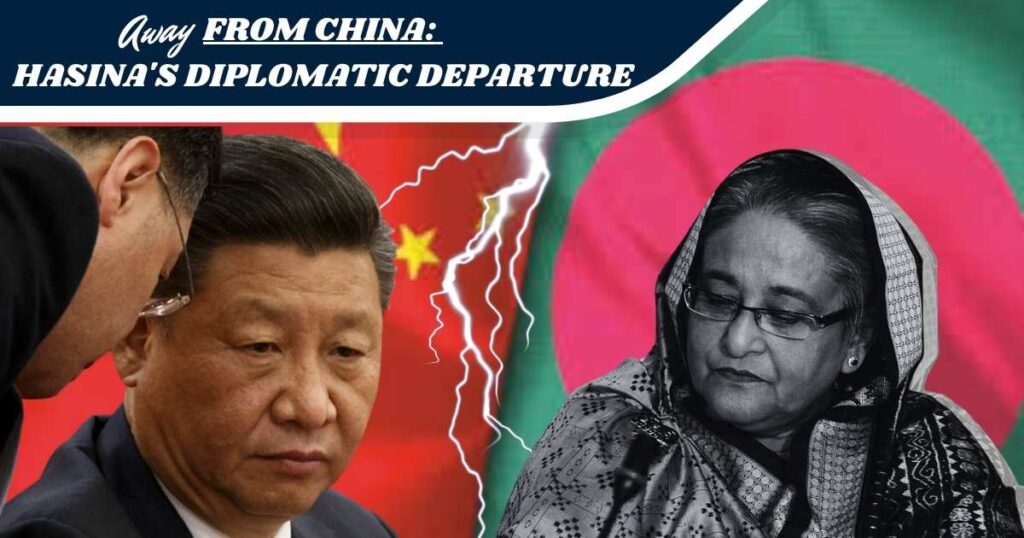In a surprising turn of events, Bangladesh Prime Minister Sheikh Hasina cut short her official visit to China, citing her daughter’s sudden illness. However, diplomatic analysts believe there is more to this story than meets the eye. The strained Bangladesh-China relations have been evident for a while, and Hasina’s premature departure could signify a deeper rift. This article delves into the factors that might have led to this situation and its implications for global geopolitics.
Focus Keyword: Bangladesh-China Relations
When Bangladesh PM Sheikh Hasina embarked on her visit to China, expectations were high. Scheduled to conclude on July 11, her visit was cut short by a day, and she returned to Dhaka on July 10. Officially, she cited her daughter’s health as the reason. However, sources and experts suggest a series of diplomatic snubs led to her abrupt departure. From the very onset, the trip seemed doomed. Hasina reportedly felt slighted by the Chinese officials’ lack of adherence to protocol. A planned extensive discussion with President Xi Jinping was cut short, and other high-profile meetings were either brief or canceled. Even more telling was the lack of substantial media coverage by the Chinese state media, which usually provides extensive coverage to visiting dignitaries.
The Waning of Bangladesh-China Relations
The strained Bangladesh-China relations have been a topic of discussion since 2021. Despite being a signatory to China’s Belt and Road Initiative (BRI) in 2016, Bangladesh’s relationship with China has seen significant ups and downs. In recent years, Bangladesh has been vocal about the subpar quality of Chinese infrastructure projects and the debt burden associated with them. This criticism peaked in 2021, leading to a noticeable cooling of relations. While China continues to be Bangladesh’s largest trading partner and a significant source of foreign investment, the promised financial support has not always materialized. During Hasina’s recent visit, China pledged $100 million in aid—a stark contrast to the $5 billion initially promised. This discrepancy likely added to Hasina’s frustration, further straining Bangladesh-China relations.
The Geopolitical Tug-of-War: India, China, and Bangladesh
Bangladesh has long tried to maintain a delicate balance between its relationships with China and India. However, recent developments suggest this balancing act is becoming increasingly difficult. Sheikh Hasina’s participation in Prime Minister Narendra Modi’s swearing-in ceremony for his third term indicated a warming of ties with India. This shift has not gone unnoticed by China, which views India’s influence in Bangladesh with suspicion. China’s investment strategy also plays a role in this dynamic. Despite Bangladesh’s stable political environment and economic potential, China has continued to invest heavily in Pakistan—a country with significant political instability and security challenges. This preferential treatment has not sat well with Bangladesh, further exacerbating tensions.
The Economic and Strategic Stakes
The economic implications of Bangladesh-China relations are significant. For the past 13 years, China has been Bangladesh’s largest trading partner, with bilateral trade exceeding $18 billion in 2022. Additionally, China’s foreign direct investment in Bangladesh stands at around $3.2 billion, making it the second-largest investor after the United States. However, Bangladesh’s concerns over the quality and reliability of Chinese military and infrastructure investments are mounting. Reports of malfunctioning Chinese military equipment and difficulties in obtaining spare parts for Chinese-made fighter jets and naval vessels have only added to the frustration.
The Future of Bangladesh-China Relations
Sheikh Hasina’s premature departure from China underscores the complexities and challenges in Bangladesh-China relations. As Bangladesh continues to navigate its diplomatic path, the implications for regional stability and global geopolitics are profound. The ongoing struggle to balance relationships with both China and India will shape the future of Bangladesh’s foreign policy. For the United States, these developments are worth watching closely. As the largest foreign investor in Bangladesh, the U.S. has a vested interest in the region’s stability and economic growth. The evolving dynamics between Bangladesh, China, and India could have far-reaching consequences for American strategic interests in South Asia.
Questions for Our Readers:
How do you think the strained Bangladesh-China relations will impact the broader geopolitical landscape in South Asia?
Please share your thoughts and insights in the comments below. Your perspectives are invaluable to understanding the complexities of international relations.

